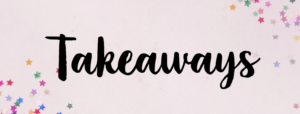I discussed the importance of reflection last week, and this week I’m walking my talk by sharing the top lessons I learned from writing The Tending Year in 2019.
This post is inspired by a similar post last year, aptly called “Lessons from 2018,” where I reviewed my first 51 posts and culled my most important realizations from the year.
Perhaps the biggest personal takeaway I’ve received this second year of The Tending Year is that I have agency to make decisions that serve me. In other words, it’s up to me to make choices that align with my values and the path I want to follow as a creator, researcher, writer, coach, friend, partner, and individual. Reviewing my posts from this year showed me a few repeating themes. I choose not to separate these out by “personal” or “professional,” because I believe that our relationships with productivity both influence and are influenced by our personal experiences.
What follows are the four biggest lessons I took away from researching, practicing, and writing the second iteration of The Tending Year. I’ve included hyperlinks to relevant blog posts within each section.
Mindset is Key
As someone healing from chronic pain and illness, who lives with Complex-PTSD, and who also is a recovering alcoholic and addict, I’ve spent a good deal of my life feeling like I have no control over my body and mind. This year was big for me in terms of developing my practice around my mindset. I learned how to recognize my workaholism and perfectionism and I intentionally decided to shift to doing a “good job” at my responsibilities. I developed emotional awareness and practices naming how I felt, which helped me not to catastrophize. As a result of my intention to name my emotions, I was able to acknowledge when my limiting beliefs were holding me back from pursuing new opportunities. I recognized that I wasn’t always kind to myself, and I committed to pausing, naming and feeling my emotions, and making rational decisions from a mindset intent on nourishing my self esteem.
Rest is Necessary
As a recovering workaholic, I’ve got a complicated relationship with rest. I used to worry that resting meant that I was missing out on opportunities (at best) or lazy and irresponsible (at worst). This last year of blogging taught me that I deserve to rest–not just because it helps me to recharge and enables me to be productive–but because it helps me to adjust my expectations for what amount and kinds of labor I should do in the first place. I endeavored to teach my readers about spoon theory this year so that they had a way to communicate their chronic illness/pain experiences to people who don’t share that experience (and so the latter group of people could be better allies to those of us who do live with chronic health issues). I developed a rest and recharge toolkit by sourcing actual tips on resting from my readers and followers. I enhanced my practice of giving myself permission to limit my productivity, and I committed to taking breaks and leaving blank space in my schedule. I’m excited to develop my rest practice more in 2020.
Set Boundaries Around Productivity and Availability
Whenever I made a decision from a place of mindfulness and intention, it turned out well for me. I don’t mean by this that I always hit my mark or writing X amount of words or earning Z amount of money; rather, I felt confident about my decisions and gained valuable feedback about how my actions served or didn’t serve my values and the personal and professional paths I’m on. Approaching my productivity via mindfulness, intention, and awareness had vast positive effects on my relationship with labor and my healing from workaholism. I practiced setting boundaries around my labor with the pomodoro method, and I found great success via reseeing my writing with what I call the Goldilocks Approach to Productivity.
Act with Intention
It should come as no surprise that the key theme I took away from 2019’s blog posts is intention. For that reason, I’ve chosen “intention” to be my guiding theme word for 2020.

I’ll send out a revamped guide to choosing your word of the year in a Tending Letter neweletter in January, so be sure to subscribe now!
Also, I’d love to hear what lessons were most helpful to you from my blog posts this year. Shoot me a message on Instagram, Facebook, or in an email!
This blog is not affiliated with, associated with, or endorsed by the Pomodoro Technique® or Francesco Cirillo.
newsletter and free resources
Sign up below to access six free resources and my newsletter, tending.

